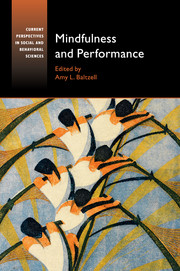Book contents
- Frontmatter
- Dedication
- Epigraph
- Contents
- List of figures
- List of tables
- List of contributors
- Preface
- Acknowledgments
- I INTRODUCTION TO MINDFULNESS: HISTORY AND THEORETICAL UNDERSTANDING
- II FORMAL MINDFULNESS INTERVENTIONS IN SPORT
- III MINDFULNESS: THEORY TO PRACTICE IN SPORT AND EXERCISE
- IV MINDFULNESS AND THE PERFORMING ARTS
- V MINDFULNESS FOR COACHES, PRACTITIONERS, AND MENTORS
- 19 Interpersonal Mindfulness for Athletic Coaches and Other Performance Professionals
- 20 Utilizing Mindfulness Strategies in Mentoring and Coaching Socially Vulnerable Youth
- 21 Awareness, Self-Awareness, and Mindfulness: The Application of Theory to Practice
- VI FUTURE DIRECTIONS
- Index
- References
19 - Interpersonal Mindfulness for Athletic Coaches and Other Performance Professionals
from V - MINDFULNESS FOR COACHES, PRACTITIONERS, AND MENTORS
Published online by Cambridge University Press: 05 January 2016
- Frontmatter
- Dedication
- Epigraph
- Contents
- List of figures
- List of tables
- List of contributors
- Preface
- Acknowledgments
- I INTRODUCTION TO MINDFULNESS: HISTORY AND THEORETICAL UNDERSTANDING
- II FORMAL MINDFULNESS INTERVENTIONS IN SPORT
- III MINDFULNESS: THEORY TO PRACTICE IN SPORT AND EXERCISE
- IV MINDFULNESS AND THE PERFORMING ARTS
- V MINDFULNESS FOR COACHES, PRACTITIONERS, AND MENTORS
- 19 Interpersonal Mindfulness for Athletic Coaches and Other Performance Professionals
- 20 Utilizing Mindfulness Strategies in Mentoring and Coaching Socially Vulnerable Youth
- 21 Awareness, Self-Awareness, and Mindfulness: The Application of Theory to Practice
- VI FUTURE DIRECTIONS
- Index
- References
Summary
We love the words “once upon a time.” They tweak our brains into receptive and ready modes to take in a story. So we wanted to begin this chapter with a tale, or rather a teaching, from the Taoist tradition that speaks to coaching practices and mindfulness. Alutcher (2013) retells the story:
The Taoists have a famous teaching about an empty boat that rams into your boat in the middle of a river. While you probably wouldn't be angry at an empty boat, you might well become enraged if someone were at its helm. The point of the story is that the parents who didn't see you, the other kids who teased you as a child, [the coach who yelled at you], the driver who aggressively tailgated you yesterday – are all in fact empty, rudderless boats. They were compulsively driven to act as they did by their own unexamined wounds, therefore they did not know what they were doing and had little control over it. Just as an empty boat that rams into us isn't targeting us, so too people who act unkindly are driven along by the unconscious force of their own wounding and pain. Until we realize this, we will remain prisoners of our grievance, our past, and our victim identity, all of which keep us from opening to the more powerful currents of life and love that are always flowing through the present moment (p. 1).
We believe that most sport coaches are good people trying to do their best, but because our brains are hardwired to perceive and remember threat, it is direct or vicarious experiences with abusive coaches that often stick with the athlete. Some coaches, probably because of their past wounds or traumas, behave like rudderless boats. We are sure most readers can quickly come up with examples from their own experiences in which they were wounded in some way by a coach on a psychologically speaking rudderless boat, and perhaps those times that they, themselves, have also behaved in a hurtful and unconscious manner.
The Taoist teaching also contains hope and a way to add a rudder to one's boat: mindful awareness of the “powerful currents of life and love that are always flowing through the present moment.” A mindful rudder may help coaches successfully navigate both the calm and turbulent rivers and seascapes of their work with athletes.
- Type
- Chapter
- Information
- Mindfulness and Performance , pp. 439 - 463Publisher: Cambridge University PressPrint publication year: 2016
References
- 3
- Cited by

